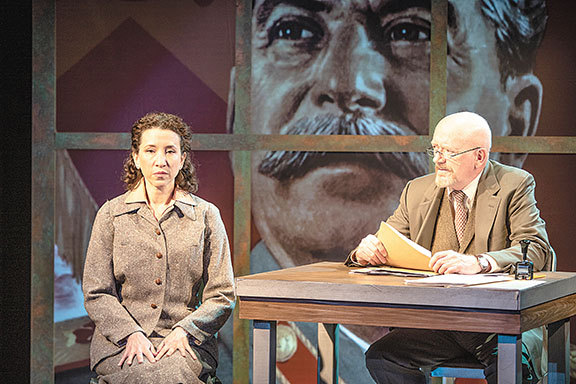
I
have only once ever before written a few lines about a play that has already closed.
In the previous instance it was to change my opinion on a musical (“The Bridges
of Madison County”,) a better production than presented on Broadway. Basically
having a richer understanding of the piece. Now I am writing a few lines on a terrific
play that has just closed that, if not exactly haunting me, keeps me thinking about
its implications.
The
play is “Memoirs of a Forgotten Man” by D.W. Gregory. It just closed a month’s
engagement at the New Jersey Repertory Company in Long Branch, N.J. I was out
of the country when the play opened and only caught up with it during one of
its final performances. Being familiar with a few of Gregory’s plays I didn’t
want to miss seeing it. I was right.
Have
you ever wondered whether what we see and hear and read with regard to a government’s
political agendas and its social policies might very well be creatively controlled
for distribution. Of course, you have. Especially as it might possibly relate
to, enhance or even muddy our own personal recollections. What if the past, as
it can be best defined by testimony, documents, and archives is not considered sacrosanct
but rather malleable to suit the tenor of the times and/or the present needs of
whatever authority or regime is in power? Apparently this is not science
fiction but the useful methodology for some governments when certain facts as they
are commonly known and defined are considered subject to interpretation and even
intervention.
This
is one of the recurring themes in Gregory’s compelling play “Memoirs of a
Forgotten Man” set in Russia in 1957 as well as in 1937. A research paper on
the nature of memory by psychologist Natalya (Amie Bermowtiz) has been
submitted for review for publication. It has been read by Kreplow (Steve
Brady), a government bureaucrat who seems to have more than a scholarly
interest in it.
The
subject of Natalya’s paper is Alexei (Benjamin Satchel), a man she has interviewed
at length for a case study involving his own remarkable memory. Apparently Alexei
was born with a mind capable of instant and impeccable recall - a repository - of
every word and event even since he was born. He forgets nothing. His memory is
additionally enhanced by a total sensory experience that includes seeing colors
and identifying smells, a known phenomenon.
As
an adult Alexei has been employed at a Leningrad news publication where he had reported
in detail on speeches made by a radical activist Nikolai Bukharin. Alexei never
took notes but relied strictly on his memory much to the consternation of his
editors. What he reported was, nevertheless, scrupulously accurate. That Bukharin
was subsequently charged and convicted of crimes against the state, as defined
by the then Stalinist regime, led to all data, photos and mention of him in
print being subjected to removal.
Alexei
is perplexed why his reporting the facts without a slant might not be in his
best interest. Eventually he seeks help from Natalya so that he can learn to
forget. The play uses flashbacks to show Alexei at home with his mother (Andrea
Gallo) and his brother Vasily (also played by Brady) where his gift might
imperil their safety.
Director
James Glossman has staged the play beautifully and chosen a cast that delivers Gregory’s
excellent text through wonderful characterizations. Except for Satchel, the
other actors play multiple characters with skill.
Bravo
to set designer Jessica Parks for providing a fine unit set that becomes a portal
to the play’s various locations. All technical aspects are top-drawer in keeping
with the professional tradition at NJ Rep.
Like
a well-constructed mystery, we get little hints of what may be developing in
the hidden and exposed relationships of the characters. A really clever device
is used to frame the play that I won’t disclose except to say the play’s
cleverness in this regard is not so nearly as memorable as is the play’s
purposeful exposure of a scary world that would allow alternative facts take
charge of our lives. Is it too close for comfort? I wonder.
No comments:
Post a Comment